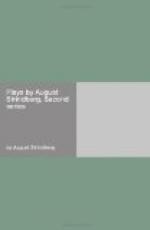The fact that the heroine arouses our pity depends only on our weakness in not being able to resist the sense of fear that the same fate could befall ourselves. And yet it is possible that a very sensitive spectator might fail to find satisfaction in this kind of pity, while the man believing in the future might demand some positive suggestion for the abolition of evil, or, in other words, some kind of programme. But, first of all, there is no absolute evil. That one family perishes is the fortune of another family, which thereby gets a chance to rise. And the alternation of ascent and descent constitutes one of life’s main charms, as fortune is solely determined by comparison. And to the man with a programme, who wants to remedy the sad circumstance that the hawk eats the dove, and the flea eats the hawk, I have this question to put: why should it be remedied? Life is not so mathematically idiotic that it lets only the big eat the small, but it happens just as often that the bee kills the lion, or drives it to madness at least.
That my tragedy makes a sad impression on many is their own fault. When we grow strong as were the men of the first French revolution, then we shall receive an unconditionally good and joyful impression from seeing the national forests rid of rotting and superannuated trees that have stood too long in the way of others with equal right to a period of free growth—an impression good in the same way as that received from the death of one incurably diseased.
Not long ago they reproached my tragedy “The Father” with being too sad—just as if they wanted merry tragedies. Everybody is clamouring arrogantly for “the joy of life,” and all theatrical managers are giving orders for farces, as if the joy of life consisted in being silly and picturing all human beings as so many sufferers from St. Vitus’ dance or idiocy. I find the joy of life in its violent and cruel struggles, and my pleasure lies in knowing something and learning something. And for this reason I have selected an unusual but instructive case—an exception, in a word—but a great exception, proving the rule, which, of course, will provoke all lovers of the commonplace. And what also will offend simple brains is that my action cannot be traced back to a single motive, that the view-point is not always the same. An event in real life—and this discovery is quite recent—springs generally from a whole series of more or less deep-lying motives, but of these the spectator chooses as a rule the one




